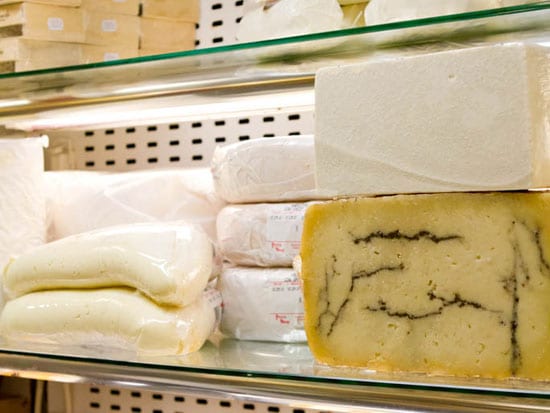– Helpful tips on how to store cheese. –
Did it happen again? Did you spend $50 at your local cheese counter, and now you’ve got more cheese than a normal human being can possibly consume in a week? Don’t worry, you’re not alone. *sheepish smile* But now you’re faced with an important question: How are you going to store all this cheese, and will it go bad if you don’t eat it right away?
How to Store Cheese, 101
Many cheeses can last a few weeks in the refrigerator, as long as they are stored properly. The goal is to let the cheese breathe while at the same time keeping it from drying out, so your best bet is to wrap it in a finely porous material, such as cheese paper or breathable plastic wrap made especially for cheese (like you see in the image above). These wrappers control the amount of moisture at the surface of the cheese while still allowing oxygen to move in and out of the packaging. All of these factors make for a substantially longer lifespan in your fridge.
When it comes to storing cheese, regular plastic wrap won’t cut it as standard plastic does not allow breathability. Cheese is a living, breathing thing, and without proper oxygen, it will suffocate (and there goes your investment in the good life!). In a pinch you can use aluminum foil, but if you’re a regular cheese shopper, it might be worth it to invest in some specially designed cheese paper.
Don’t have any fancy cheese paper lying around? Never fear, my dear – regular old parchment paper will work just fine when it comes to storing cheese. Do not wrap your cheese too tightly, as you want the air to be able to circulate, but don’t wrap it so loosely that it will dry out. Secure the paper with a small piece of tape, then wrapping it loosely in plastic wrap to help trap a little moisture. Voila, well-stored cheese.
How to Store Blue Cheese (which has slightly special needs)
Blue cheese is a little different, given that special molds are added to the curds to give them their signature spicy bite. These molds have their own special needs. If you’re storing a blue variety, feel free to wrap it in aluminum foil; in fact, you might have noticed that some of the blue cheeses you buy come wrapped in foil already.
A Heavenly Cheese Oasis
It’s a good idea to keep cheese in your crisper (the drawer in your refrigerator made to store vegetables). These little drawers are actually somewhat climate-controlled to keep your veggies fresher for longer, and they perform the same function when it comes to keeping cheese. Some fridges even have a cheese drawer, in which case use that.
How Long Can You Store Cheese?
Most hard, aged cheeses will last up to a month or longer when kept properly, and semi-firm cheeses can last up for two to three weeks if conditions are ideal. Soft cheeses can ammoniate if held improperly or for long periods of time, so try to eat those quickly.
If you’ve stored your cheese for a while and you notice a few spots of fuzzy mold growing on it, don’t panic. Remember that cheese is fermented with a series of molds and bacterias, so if you notice a little patch of extra mold here or there, it’s perfectly safe to scrape it off. If the cheese has been completely overtaken by mold, well, give it a burial at sea.
Storing Cheese In the Freezer?
And, because someone always asks: Please, for the love of god, don’t freeze your cheese, ok? Dairy does not generally take well to freezing, especially soft or semi-firm cheeses. That said, I’ve stored hard cheeses, such as Parmigiano-Reggiano and Pecorino in the freezer and it defrosted surprisingly well. But as a general rule, don’t freeze cheese!
This content was originally posted on FearlessFresh.com.

